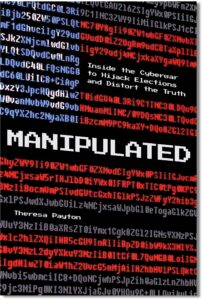Cybercrime, Privacy and Information in Today’s World
February 23, 2021 over Zoom
Final Draught was conceived as an opportunity to bring thought leaders together with Library supporters for engaging conversation on timely topics.
Theresa Payton brought us a discussion that was more than engaging – it was urgent. And she’s the expert.
 Payton, the author of Manipulated: Inside the Cyberwar to Hijack Elections and Distort the Truth, is also the first female White House Chief Information Officer, a leading cybersecurity and intel expert, CEO of Fortalice Solutions, reality TV star, news contributer, and one of Business Insider’s Top 50 People to Follow. And she lives here in Charlotte.
Payton, the author of Manipulated: Inside the Cyberwar to Hijack Elections and Distort the Truth, is also the first female White House Chief Information Officer, a leading cybersecurity and intel expert, CEO of Fortalice Solutions, reality TV star, news contributer, and one of Business Insider’s Top 50 People to Follow. And she lives here in Charlotte.
Library Foundation board member Barb Ellis moderated the conversation, bringing her 40 years’ experience in technology, and the two spoke about the quickly-changing industry, the observations that led Payton to write her book, and some practical steps we can all take to recognize and expose disinformation campaigns online.
Payton realized before the 2016 election that both businesses and individuals were suffering from disinformation campaigns. At the time, she saw primarily reputation damage, but realized it wouldn’t end there. Research led her to conclude that the manipulators included nations, and in the age of social media the numbers of people exposed to misinformation and disinformation continues to steadily rise. Repeated exposure leads to confusion – when we don’t know what or who to believe, we are open to believing anything. And that’s the terrifying goal.
“The enemy has entered the gates,” writes Payton.
Her book agent at first thought the subject matter would be too scary for readers. But Payton believes we each have a duty to stop this, and she paints a story of the fix as complex, but imperative and achievable.
Payton notes that women, and especially women of color are often targets of internet trolls, and she had to speak up. “Big tech and social media admit we need to do better. But we aren’t. The manipulators are staying ahead of our efforts,” she explained.
So how do consumers determine what’s true? Payton recommends that we try to confirm a story from three different trusted, vetted news sources – one local, one national and one international. If the story isn’t trending on all three, it might be a manipulation campaign. She also recommends checking Snopes, Factcheck or Politifact. Or, type part of the headline in a search engine, and the word “scam” to see if a story has been reported as misinformation.
Payton and Ellis both credit libraries with helping to train the public in information literacy, and to understand and recognize the source of the news we consume. But we have a long way to go, and Payton advocates for an international coalition to lay out rules for cyberspace. “We have laws for all kinds of crime – why not cybercrime? There’s a lot that needs to be done here to define what’s legal and what isn’t, and what are the global repercussions. We have guardrails in the physical realm that can be a launchpoint for the digital realm.”
In the meantime, Payton reminds us that it’s easy to fall victim to a misinformation campaign, and very easy to share a post or a tweet without realizing you’re helping to spread the misinformation. “When you come upon a post by someone you know that you believe is misinformation, approach them privately and with understanding. Tell them you found the post interesting and looked up a few things and uncovered a different take. If you’re gentle with the correction, it will be better received and potentially corrected. We all deserve love and grace.”
To learn more about Manipulated: Inside the Cyberwar to Hijack Elections and Distort the Truth, check it out at Charlotte Mecklenburg Library!



